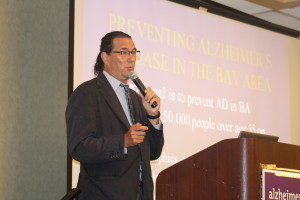Notes from Updates on Dementia: An overview of ADNI
Michael Weiner, M.D., director of the Center for Imaging of Neurodegenerative Disease, San Francisco VA Medical Center and professor of Radiology, Medicine, Psychiatry and Neurology with UCSF discussed the Alzheimer’s Disease Neuroimaging Initiative (ADNI).
Dr. Weiner is a principle investigator on the project, which is a collaborative effort of scientists from around the world. The project was funded by $140 million from several organizations including the National Institutes of Health (NIH) and the Alzheimer’s Association – this is the largest funding for a project of this type.
According to Dr. Weiner, the goals of ADNI is to create a broad, observational clinical trial to discover how Alzheimer’s disease progresses, who develops the disease, who doesn’t and why. The project seeks to:
- Evaluate whether brain imaging, biomarkers in blood and spinal fluid, and other tests can detect brain changes associated with normal aging, memory problems and Alzheimer’s disease in living individuals
- Shed light on physical and cognitive changes that occur as people transition from normal aging to the earliest stages of memory loss, mild cognitive impairment (MCI) and Alzheimer’s disease
- Enable the earliest possible diagnosis, potentially even before symptoms appear
- Speed development of better drugs by providing tools to monitor change and assess treatment effectiveness
- Identify prevention strategies
The research community has a lot of reason for optimism with ADNI, which has been funded on a much smaller scale since 2004. Several great findings have already come out of those first few years of ADNI so the future is bright!
Learn more about Alzheimer’s research at www.alz.org/research.
Helpful information related to this story:
About the Alzheimer’s Disease Neuroimaging Initiative


















